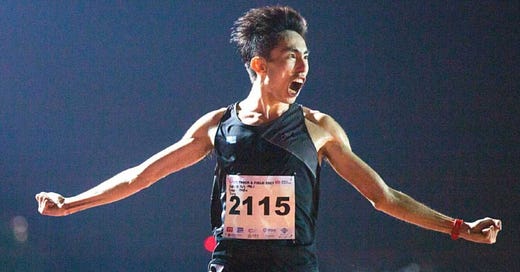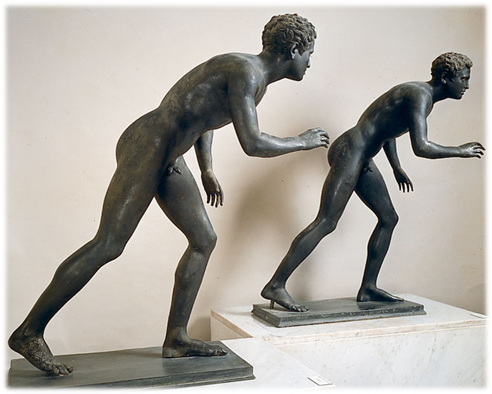Singapore wouldn't let their fastest runner compete because he was a terrible 'sport'
Lessons from modern and ancient sport to help you get the MOST out of your will to compete
How you play the game matters more than the outcome
When the tiny island country of Singapore sent their national team to the 2022 Asian Games, one athlete was surprisingly left off. Despite setting the national record for fastest Marathon time, the team’s adminstrators kept distance runner Soh Rui Yong off the team.
What happened that led to this strange situation and what does it teach us about the role of humility and character in athletics?
Character over Performance
Here’s a quick recap of why Yong was left off the team despite being the country’s most profilic and accomplished distance runner.
In Singapore, sports are viewed as team events even when it’s an individual competition. Individuals are supposed to be great teammates and ambassodors of the positive role of sports to create strong character. Yong let his performances go to his head and he stepped outside of those established boundaries.
In 2015 he was involved in Marathon where sportsmanship was on display by his Singaporian teammate Ashley Liew.
In the race Liew was the only runner to correctly identify the first turn, while all other runners went much further than the course demanded. Instead of using this to his advantage, Liew purposefully slowed down and let the others runners catch up. Yong won the race and then denied Lew’s act of sportsmanship, causing the initial outrage around his own lack of proper sporting character.
Liew sued Yong and won in court. Yong then made a host of disparaging remarks on Social Media about more of his teammates. This is what adminstrators point to when keeping him off the national team. Here’s their specific statement on leaving him off the 2022 Asian Games team:
"In particular, Mr Soh continued to make disparaging and derisive remarks about others in the public domain. This behaviour does not commensurate with his apology given, undermines the sincerity of his commitment to avoid posting controversial content on social media, and renders his assurance to conduct himself in a more constructive, mature and professional manner hollow.
“It is unfortunate that notwithstanding efforts made to support and rehabilitate him, the committee is not satisfied that he has changed for the better to earn selection for the Asian Games."
History Doesn’t Repeat but it Rhymes
This story stands out to me for a bunch of reasons.
I’m most reminded of the fierce attachment the ancient Greeks held for the athletes that represented them at the ancient Olympics. In particular the story of one athletes, Astylos of Croton, stands out. Here’s the quick recap.
He competed for his home city of Croton in 488BC winning two running races. But fame and riches were too tempting for Astylos. In 484BC and 480BC he competed for the Greek colony of Syracuse, located on the island of Sicily. This made him the first free agent in sports history!
How did the people of Croton react?
They burned down the statue of Astylos they built to commemorate his Olympic victory. They symbolically turned his house into a prison. His family renounced him and the citizens banished him from ever returning.
Why did they react so severely?
Because athletes at this time didn’t compete for riches, fame, or status. They competed for glory and internal pride. Olympic victors only received an Olive wreath for their victory.
Asylos betrayed the character he was supposed to exhibit as an athlete. His accomplishments were discared as soon as he acted in a way unbecoming on an athlete. Character mattered more than the outcome.
What does it mean for the average athlete?
The example of Astylos and Yong teach us a great deal about the importance of sport.
Too often in the modern world we focus only on the objective elements of sport. We care only about the performance and equate winning with the moral outcome in sport. Athletes who excel are praised and rarely do we question the means that allowed them to reach their lofty heights.
We need to remember the subjective elements. The ends don’t justify the means. Outcomes over process will lead to immoral acts condoned as ‘justifiable’ if they edge us closer to victory.
For the average athlete who isn’t a pro and just wants to compete for themselves it’s crucial we remember this.
Let’s use sports as they should be, to engender positive character traits and to use the voluntary submission to struggle as a means to grow into better individuals.
When you compete be the happiest and most encouraging person.
When you train enjoy every element because the process is the reward.
When you spectate demand the best characters and not the best ‘performer’
If you keep these in your mind and demonstrate them through your actions you’ll get the best of sports to help you reach your true potential.






What a great modern lesson tied to an ancient lesson about an eternal truth!
Especially great how you tied this to being particularly important for the non-pro athlete.